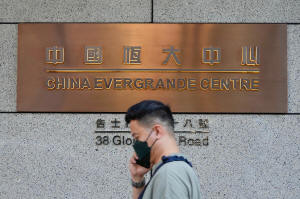China Evergrande to be delisted from Hong Kong stock exchange following
debt woes
[August 13, 2025] By
KANIS LEUNG
HONG KONG (AP) — The severely indebted real estate developer China
Evergrande, already in the process of liquidation, said on Tuesday it
will be delisted from Hong Kong’s stock exchange on Aug. 25, another
setback to mainland China’s property sector.
Evergrande was the world’s most heavily indebted real estate developer,
with over $300 billion owed to banks and bondholders, when the court
handed down a liquidation order in January 2024. The court had ruled
that the company had failed to provide a viable restructuring plan for
its debts, which fueled fears about China’s rising debt burden, and
trading of its shares has been halted since the ruling.
The city's rules stipulate that the listing of companies may be canceled
if trading in their securities has remained suspended for 18 months
consecutively.
China Evergrande Group received a letter Aug. 8 from the city's stock
exchange notifying the firm of its decision to cancel the listing as
trading had not resumed by Jul. 28. The last day of the listing will be
Aug. 22 and Evergrande will not apply for a review of the decision, the
company said in a statement.
“All shareholders, investors and potential investors of the company
should note that after the last listing date, whilst the share
certificates of the shares will remain valid, the shares will not be
listed on, and will not be tradeable on the Stock Exchange," the
statement said.

Evergrande is among scores of developers that defaulted on debts after
Chinese regulators cracked down on excessive borrowing in the property
industry in 2020. Unable to obtain financing, their vast obligations to
creditors and customers became unsustainable.
The crackdown also tipped the property industry into crisis, dragging
down the world’s second-largest economy and rattling financial systems
in and outside China. Once among the nation's strongest growth engines,
the industry is struggling to exit a prolonged downturn. Home prices in
China have continued to fall even after the introduction of supportive
measures by policymakers.

The Hong Kong court system has been dealing with liquidation petitions
against some Chinese property developers, including one of the largest
Chinese real estate companies, Country Garden, which is expected to have
another hearing in January.
China South City Holdings, a smaller property developer, was also
ordered to liquidate on Monday.
[to top of second column] |

A man walks past the entrance of the headquarters of China
Evergrande Group in Hong Kong Monday, Oct. 4, 2021. (AP
Photo/Vincent Yu, File)
 Evergrande, founded in the mid-1990s
by Hui Ka Yan, also known as Xu Jiayin, had over 90% of its assets
on the Chinese mainland, according to the 2024 ruling. The firm was
listed in Hong Kong in 2009 as “Evergrande Real Estate Group” and
suspended its share trading on Jan. 29, 2024, at 0.16 Hong Kong
dollars ($0.02).
Its liquidators said in a progress report that they received debt
claims totalling $45 billion as of Jul. 31, much higher than the
some $27.5 billion of liabilities disclosed in December 2022, and
that the new figure was not final.
The liquidators said they have assumed control of over 100 companies
within the group and entities under their direct management control
with collective assets valued at $3.5 billion as of Jan. 29, 2024.
They said an estimate of the amounts that may ultimately be realized
from these entities wasn't available yet.
About $255 million worth of assets have been sold, the liquidators
said, calling the realization “modest." Of this amount, $244 million
was derived from subsidiaries’ assets, and not all of them will be
available to the company, given the complex ownership structures of
the assets.
“The liquidators believe that a holistic restructuring will prove
out of reach, but they will, of course, explore any credible
possibilities in this regard that may present themselves,” they
said.
Hui, Evergrande's founder, was detained in China in September 2023
on suspicion of committing crimes, adding to the company’s woes.
In 2024, the China Securities Regulatory Commission issued a fine of
4.2 billion yuan (about $584 million) against the firm's subsidiary,
Hengda Real Estate Group Company, over violations including
falsifying financial records. Hui was fined 47 million yuan ($6.5
million) and barred from China’s securities markets for life. Some
other executives were also penalised.
Chinese authorities in September 2024 banned the accounting firm PwC
for six months and fined the company more than 400 million yuan
($56.4 million) over its involvement in the audit of the collapsed
property developer.
All contents © copyright 2025 Associated Press. All rights reserved |